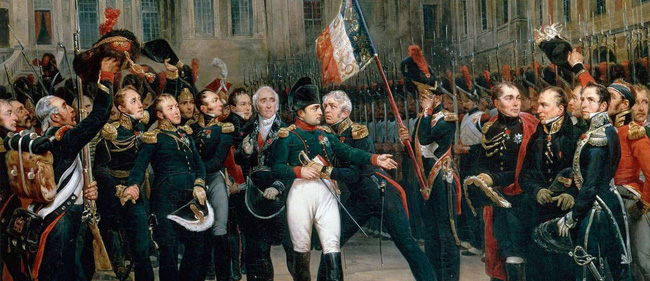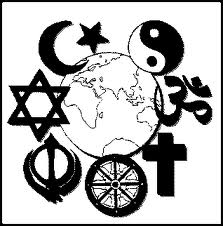“The Stupidity of Belief”: The Inner Politics and Nature of Mankind Have Not Changed in 7,000 Years

Oh, How primitive we are still!
Around 1600, when Europeans began to use the methods of learning that are now called scientific, Galilleo peered at the moon. In 1969, a man walked on the moon. In fewer than 400 years, people went from peering at the moon to walking on it.
Scientific knowledge works. Yet beliefs, claims that are not and often can never be known, have caused human beings to kill each other in wars at least since the first city states were organized around 4,000 BCE.
The people who lived in these states believed that their cities were protected by patron deities and when the cities went to war, the war was thought of as fought for or even by the deities themselves. Ever since, war has always had a religious aspect. Armies have always gone into battle believing god was on their side, even when two peoples who claimed to believe in the same god fought each other. The absurdity of that seems to have always eluded people. It is noteworthy that even today the leaders of nations ask their patron deities to bless their countries.
 The American president, for instance, always asks god to bless America, never the American people. Gods, it seems, only protect states, not their peoples who are decimated in wars for the sake of their nations. Remember John F. Kennedy’s “ask not what your country can do for you, ask what you can do for your country.” Throughout human history, people, like soldier ants, have always existed to preserve the state rather than visa versa. So here we are, seven millennia since the founding of city states, still acting just like the pagans of Mesopotamia. For seven millennia of belief guided human history, the progress of human nature has stood still!
The American president, for instance, always asks god to bless America, never the American people. Gods, it seems, only protect states, not their peoples who are decimated in wars for the sake of their nations. Remember John F. Kennedy’s “ask not what your country can do for you, ask what you can do for your country.” Throughout human history, people, like soldier ants, have always existed to preserve the state rather than visa versa. So here we are, seven millennia since the founding of city states, still acting just like the pagans of Mesopotamia. For seven millennia of belief guided human history, the progress of human nature has stood still!
I have written previously that mankind is creedal rather than rational an that ideology (creed, dogma, belief) is a lie that will not die. Religious beliefs certainly exhibit those characteristics. The primitive nature of religion is also evident. In the Ancient World, religious rites were practices to propitiate gods. Today they are used to dispatch dead souls to their rightful places in eternity. The funerals of Antonin Scalia and Nancy Reagan are examples of rites that date at least as far back as the Roman Empire. It is clear that the conventional notion is that religious belief is a “higher” virtue. Those with it are considered to be better than those without it. This notion persists despite the large number of logical absurdities that have been identified in religious doctrines and other creeds. Remember Tertullian’s Credo quia absurdum—”I believe because it is absurd.”
Despite this history, people seem to be addicted to creeds. In the United States of America, whose Constitution prohibits the Congress from adopting a state religion, officials still commonly speak the language of belief—”In God we trust,” “one nation under God,” and “God bless America.” Yet religious Americans worship multiple gods. Freedom of religion is a constitutional right. So the word ‘god’ in these expressions has no definitive denotation. The God of the New Testament is incompatible with the God of the Torah. Americans seem oblivious to the fact that a sentence containing a substantive with no denotation is utterly meaningless, and any connotation it possesses is entirely subjective.
 The French, during the Revolution of 1789, sought to destroy the Catholic religion specifically and religion in general. But in 1801, Napoleon signed an agreement with Pope Pius VII marking an end to the attempt. Similarly, during the First World War. Orthodox Russian prelates carried holy icons through the trenches before battles begging God to bring victory in coming battles only to see the Russian army annihilated instead. So when the Russian Revolution occurred in 1917, the newly created Union of Soviet Socialist Republics banned religion and locked the doors to all churches. Yet in 1991, when the USSR was transformed into the Russian Federation, the church doors were unlocked and the Russian people flocked to churches to resume their faith in the Orthodox Church. Similar attempts to promote the eradication of religious belief are going on in China with little success. What accounts for this persistence of creedology?
The French, during the Revolution of 1789, sought to destroy the Catholic religion specifically and religion in general. But in 1801, Napoleon signed an agreement with Pope Pius VII marking an end to the attempt. Similarly, during the First World War. Orthodox Russian prelates carried holy icons through the trenches before battles begging God to bring victory in coming battles only to see the Russian army annihilated instead. So when the Russian Revolution occurred in 1917, the newly created Union of Soviet Socialist Republics banned religion and locked the doors to all churches. Yet in 1991, when the USSR was transformed into the Russian Federation, the church doors were unlocked and the Russian people flocked to churches to resume their faith in the Orthodox Church. Similar attempts to promote the eradication of religious belief are going on in China with little success. What accounts for this persistence of creedology?
In fact, this persistence is so strong that it is commonly considered to be virtuous. The admonition, “Stand up for your knowledge” is never heard, but “Stand up for your beliefs” is common. Yet if beliefs are claims that are not known to be true or cannot ever be known to be true, the admonition advises people to maintain and flaunt their ignorance. Creedology is an attribute of utter stupidity. Still creeds seems to be what human beings live by.
 Any nation’s “way of life” is defined by its creeds—religious, political, economic, social, educational. No one has ever shown that any of these creeds is better than the others. As a matter of fact, creedology is such a dominant trait of human beings that even science has become a creed. Not only does science consist of a well defined group of methods of learning, it also conveys the belief that those methods will eventually solve all of mankind’s problems, a belief entirely like the Christian belief in the Second Coming. But there is not one iota of evidence to support this belief. Instead of science making mankind less creedal, creedalism has made science into just another creed. Science has become nothing but a handmaiden of belief. Scientists are now as much soldiers in ideological wars as seekers of knowledge. This kind of science will never make it possible for human beings to live in harmony with nature or live together in peace. Unless human beings can be weaned off of this attachment to belief, Homo Sapiens is a doomed species.
Any nation’s “way of life” is defined by its creeds—religious, political, economic, social, educational. No one has ever shown that any of these creeds is better than the others. As a matter of fact, creedology is such a dominant trait of human beings that even science has become a creed. Not only does science consist of a well defined group of methods of learning, it also conveys the belief that those methods will eventually solve all of mankind’s problems, a belief entirely like the Christian belief in the Second Coming. But there is not one iota of evidence to support this belief. Instead of science making mankind less creedal, creedalism has made science into just another creed. Science has become nothing but a handmaiden of belief. Scientists are now as much soldiers in ideological wars as seekers of knowledge. This kind of science will never make it possible for human beings to live in harmony with nature or live together in peace. Unless human beings can be weaned off of this attachment to belief, Homo Sapiens is a doomed species.
But such a weaning might not be possible. The human attachment to belief might be instinctive. In fact, considering the attachment to belief as instinctive might be the only way to explain the human attachment to creeds for over seven millennia, which makes all of the horrible deeds of people to be the result of a generic trait rather than personal faults.
Is this stupidity the essence of the human condition? It is if standing up for beliefs is a virtue rather than a vice. Standing up for what is known to be true is the better practice.
People do not wage war over what mankind knows; they wage war over what they merely believe and that is doubly dumb.
John Kozy is a retired professor of philosophy and logic who writes on social, political, and economic issues. After serving in the U.S. Army during the Korean War, he spent 20 years as a university professor and another 20 years working as a writer. He has published a textbook in formal logic commercially, in academic journals and a small number of commercial magazines, and has written a number of guest editorials for newspapers. His on-line pieces can be found on http://www.jkozy.com/ and he can be emailed from that site’s homepage.

